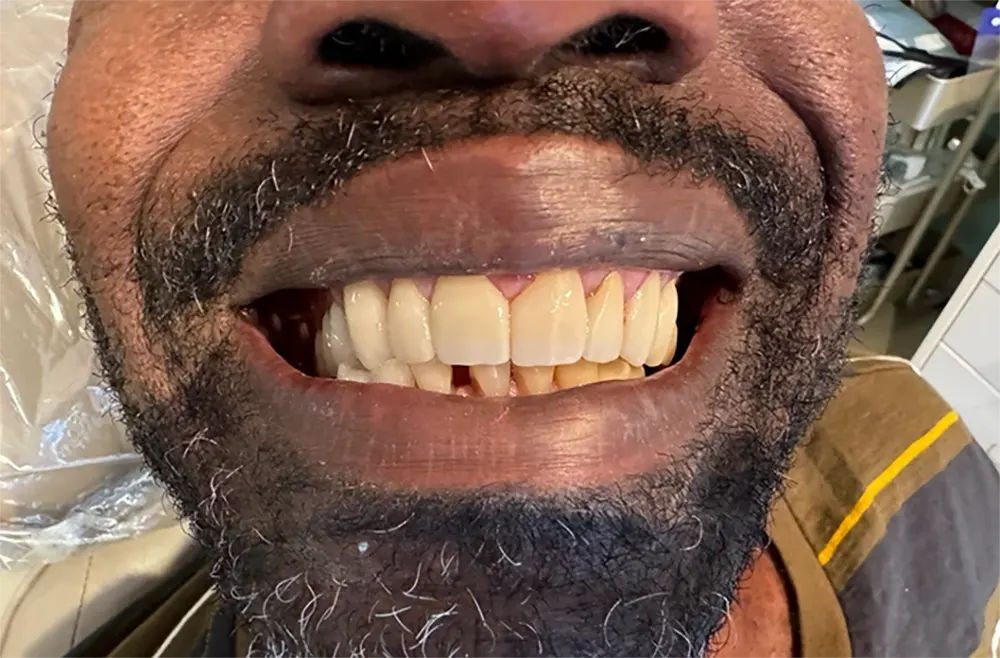
The author of the article
Boris Lipovetskiy, DMD, 31 years experience
Classic titanium implants are the preferred method for restoring lost teeth. However, this method is not always suitable for everyone. Therefore, in this article, we will describe alternatives to dental implantation. These include bridges, removable prosthetic options, and orthodontic treatment. We will also discuss what zirconium implants are, and the "Teeth in a Day" service.
Why Would Someone Want an Alternative Treatment to Dental Implants?
Traditional titanium implants are a modern method for restoring the chewing function and aesthetic of the dental arch. They are used when one, several, or all teeth in the jaw are lost. Titanium implants fully assume the function of tooth roots and are compatible with oral tissues. However, there are cases where implants are not suitable, including:
-
Allergy to anesthetics
-
Metal intolerance to components of the titanium alloy
-
Progressive bone diseases
-
Severe systemic pathologies
Nevertheless, a patient may choose not to undergo this treatment option for personal reasons. In these cases, alternatives to dental implants are used. We recommend Zirconia Crowns, advantages of Zirconia Crowns include:
-
Cosmetically more attractive
-
Fast healing time post-treatment
-
Very durable
-
Suitable for patients allergic to metals (if you’re in doubt whether you’re allergic to a certain material, an allergy test will be administered to help us determine your treatment options)
There is no better replacement. If a tooth is lost, an implant remains the best solution. It restores chewing function by 100% and evenly distributes the load on the jawbone. After installation and complete integration, you are able to eat any food. The pressure exerted on the implants ensures full blood supply to the bone and regeneration, preserving its strength and volume.
Crowns/bridges have an average life-span of 5-10 years, and implants can last from 15 to 20 years. If conditions are right, implants can even last a lifetime.
Implants can fail due to systemic health issues such as diabetes, bad hygiene, occlusion, smoking etc.
-
Fear of Surgery
Some patients fear surgical procedures, often due to negative experiences with dental treatments, such as when implants failed to integrate.
At our clinic, we adopt a holistic approach to treatment, using high-quality zirconium implants. Patients are thoroughly prepared for surgery, with all possible risks excluded.
Modern implants, even from budget brands, have a high success rate of 97% or higher. Rejection most often occurs when patients neglect the postoperative recommendations of their doctors.
-
Financial Constraints
When it comes down to it, implants are less expensive in the long-run. We work with reliable American and Swiss manufacturers that offer quality implants that last 15-20 years. With proper oral care and regular check-ups, they can even last a lifetime.
Implantation is more cost-effective and safer than other treatment options. Any prosthesis has a limited lifespan and can affect the condition of surrounding teeth and the bone tissue beneath it. The need for periodic replacement and additional procedures gradually increases the cost of treatment.
Additionally, some types of treatment, such as same-day tooth restoration, can be financed through credit options at the dental office.
-
Medical Contraindications
We help eliminate relative contraindications, predict treatment outcomes, and mitigate risks that could prevent the implant from integrating. If there are absolute contraindications, we look for alternatives to implants.

Implantation Takes a Long Time. Should You Look for Alternatives?
Boris Lipovetskiy
Dentist with 30 years of experience
You don't need to look for alternatives to dental implants if there are no medical contraindications. We use zirconium implants, which have a high degree of osseointegration.
Additionally, we utilize the Teeth in a Day technique, allowing us to restore even a toothless jaw in a single visit. Patients go home with new teeth on the same day.
What Can Replace a Dental Implant?
A patient cannot decide this on their own. The method of restoring a lost tooth depends on the specifics of the clinical case. The dentist determines the best replacement after a detailed and comprehensive examination of the patient. This includes an examination, medical history collection, X-rays, and tests. If implants are contraindicated, the dentist will suggest alternative options.
Dentures
A removable denture consists of an artificial gum (base) and attached plastic crowns. It may have a metal framework (partial denture). Patients can remove this type of denture themselves for cleaning and as needed. The designs vary in material (nylon, acrylic, and other materials) and can be either full or partial dentures.
A full denture is used for an edentulous (toothless) jaw. It adheres to the mucous membrane. Special adhesive cream can be used to improve its fixation.
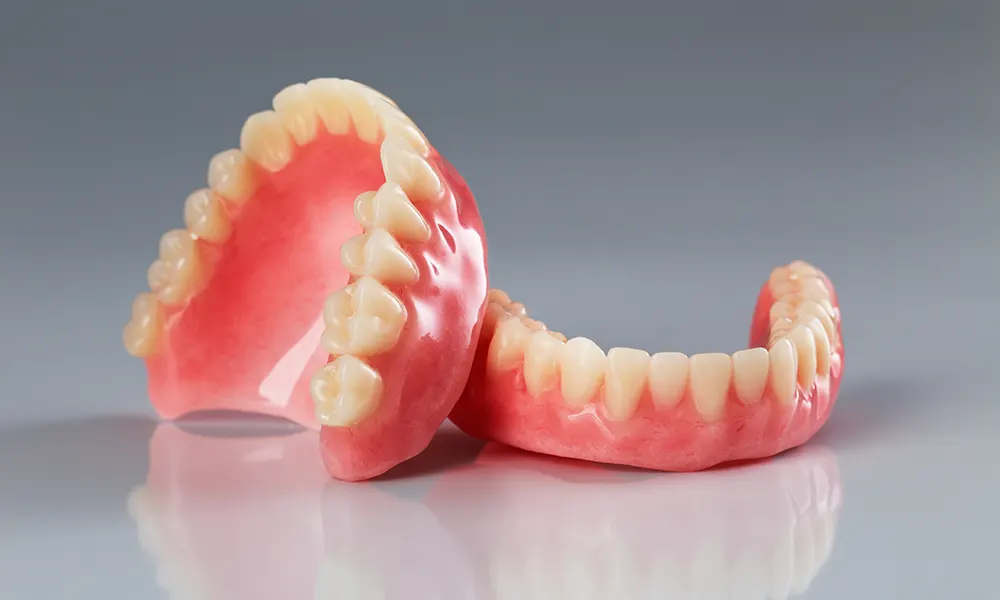
A partial denture is used when several teeth are missing. It is secured to the adjacent teeth with special plastic or metal attachments called clasps or attachments
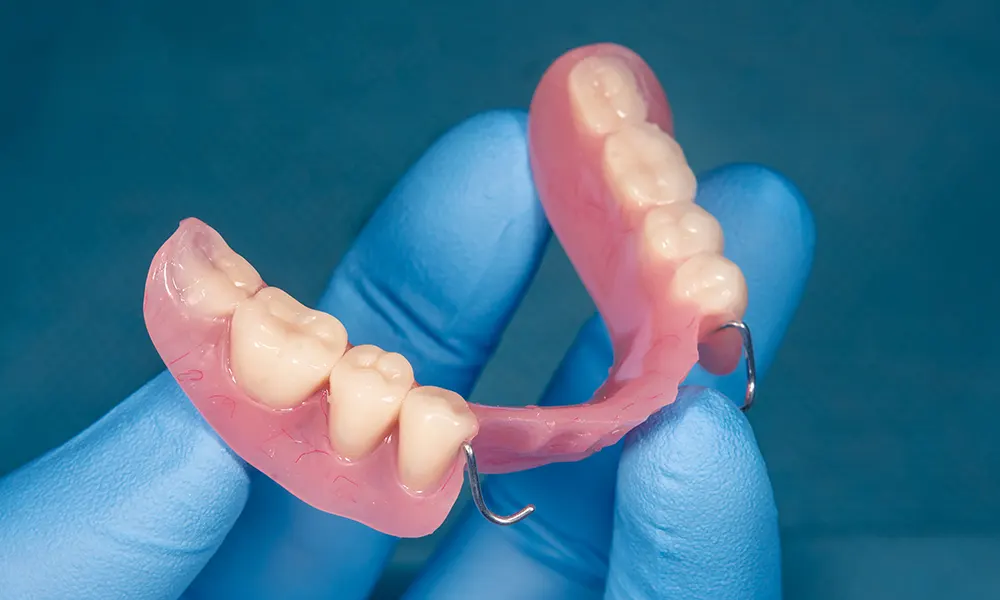
-
No surgery needed
-
Quick restoration
-
Aesthetically pleasing
-
Affordable cost
-
Average lifespan of 5-7 years
-
Attachments may be visible with a wide smile
-
Limited diet
-
Chewing function restored to only 30-40%
-
May affect speech and taste
-
Can fall out during intense chewing or talking
-
Bone resorption under the denture continues
Suitable For:
-
Missing one or several teeth in a row
-
Completely edentulous (toothless) jaw
Dental Bridge
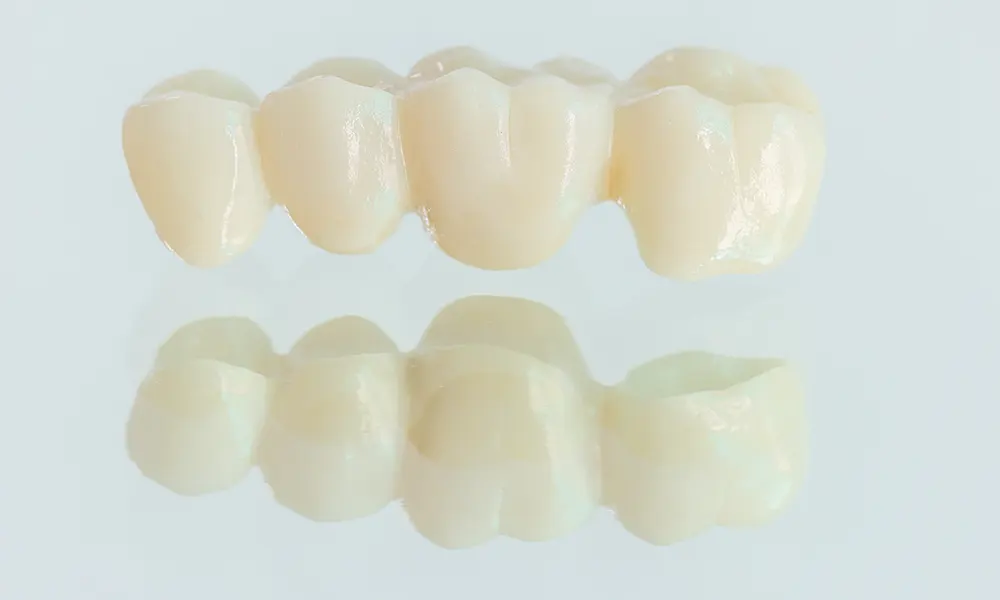
A dental bridge is a prosthesis consisting of several fused teeth crowns (usually 3-4). The end crowns are hollow and are placed over the supporting teeth. The crown in the middle replaces the lost tooth. In addition to this option, there are bridge prostheses used in cases where every other tooth is missing. Bridges are made of metal-ceramics, ceramics, and zirconium dioxide.
-
Installation does not require surgery
-
Easy rehabilitation
-
Quick restoration of chewing function
-
Natural-looking smile
-
Comfortable to wear
-
Restoration of normal speech
-
Durable construction
-
Lower cost compared to implantation
-
Average lifespan of 10 years
-
Not suitable if the last molars in the row are missing
-
Bone resorption continues
-
Adjacent teeth deteriorate faster due to reshaping and additional load
-
Supports often do not fit for reinstallation of a new bridge prosthesis
-
After the supports wear out, the supporting teeth still need to be replaced with implants to restore normal chewing function
Suitable for 1-3 missing consecutive teeth with healthy teeth on both sides of the gap.
Teeth in a Day
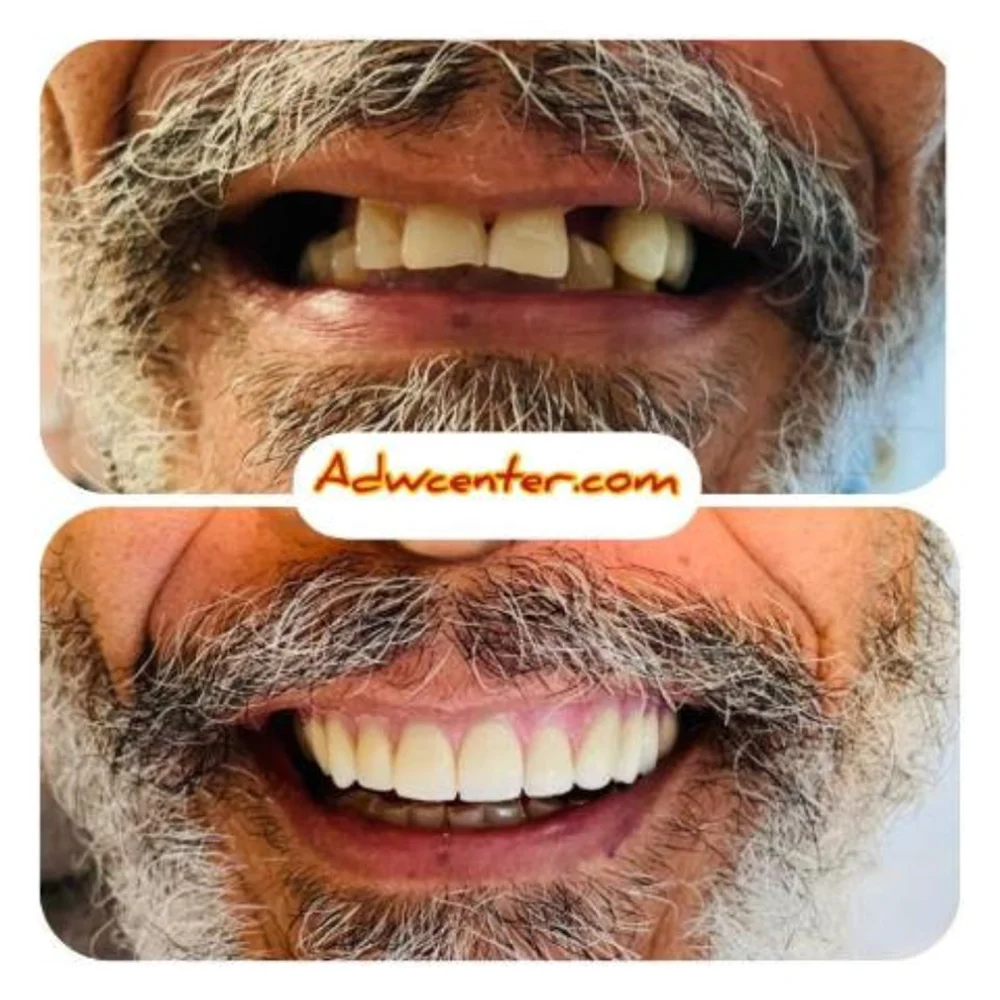
When traditional titanium implants are contraindicated, zirconium implants can be placed in a single day.
1. The dentist examines your teeth, performs diagnostics, and plans the treatment.
2. Anesthesia is administered.
3. A small incision is made in the gum, and a bed is prepared in the bone.
4. The implant is placed in the prepared bed at a specific angle. An abutment is fixed on top, followed by a temporary prosthesis.
5. After the implant integrates (in 3-6 months), a permanent prosthesis is placed.
-
Implants can last a lifetime with proper dental care
-
Minimal invasiveness
-
Smile restoration in one day
-
No need to install a gum former
-
Can be performed even with bone atrophy
-
No contraindications to surgery
Suitable For:
-
Partial or complete edentulism with moderate or severe bone atrophy
-
If a patient has an allergy to impurities in titanium alloy
Zirconium dioxide is bioinert: it does not interact with the body, does not oxidize, and does not cause allergic reactions. This reduces the risk of rejection due to material intolerance. Zirconium implants integrate almost as quickly as titanium ones.
Bite Correction Instead of Teeth Implantation
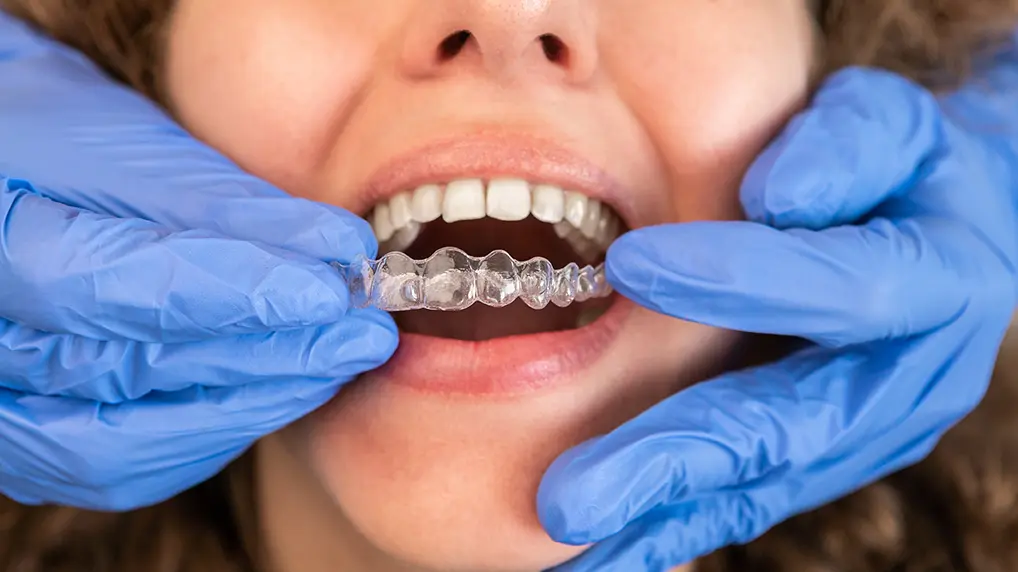
A neighboring tooth can occupy the space of a missing tooth. This can be achieved using aligners while simultaneously correcting the bite, especially when there is limited space on the jaw.
-
Non-surgical treatment
-
Preservation of bone tissue
-
Bite correction
-
Normalization of speech
-
Improvement in facial shape
-
Long treatment duration – from 1 year to 2.5 years
-
Requires visits to the orthodontist every 1-3 months
-
Not suitable for front teeth or in cases of multiple defects
Suitable For:
-
Missing one tooth in the lateral area, often the sixth molar or fifth premolar
-
Good bone tissue condition
-
Preserved terminal molars
Choosing an Alternative to Implants
| Defect Characteristics | Suitable Options |
|---|---|
| Molars |
|
| Front teeth |
|
| Missing 1-2 teeth |
|
| No molars |
|
| No teeth |
|
Alternatives to dental implants can be combined when there are multiple defects located in different jaws or in two sections of the dental arch. Here is an example of a treatment case at Advanced Dental Wellness Center:
This patient was missing teeth in both the front and lateral sections of the upper jaw. To restore the front teeth, we placed a ceramic bridge on the supports. This material mimics the properties of enamel, making it ideal for the smile zone. Additionally, it withstands chewing loads excellently.
The dentist at Advanced Dental Wellness Center restored the missing molar with a partial denture and anchored it to healthy supports. The attachments securely hold the structure and are not visible when the patient smiles.
If you need to restore one, several, or all of your teeth, you can schedule an appointment with a dentist at Advanced Dental Wellness Center. The dentist will assess your situation, prescribe the necessary examinations, and choose the most suitable method of implantation or an alternative to dental implants.
FAQ
Only a dentist can determine this after a preliminary examination. In most cases, implantation is possible immediately or after addressing any risks.
Sources of information
- Chapter 4 – Dental Implants. Belinda Reinhardt, Thomas Beikler. Advanced Ceramics for Dentistry 2014, pp. 51-75. URL: https://www.sciencedirect.com/science/article/abs/pii/B9780123946195000043
- Zirconia in dental implantology: A review. Abhishek Apratim, Prashanti Eachempati, Kiran Kumar Krishnappa Salian et al. J Int Soc Prev Community Dent. 2015 May-Jun; 5(3): pp. 147-156. URL: https://www.ncbi.nlm.nih.gov/pmc/articles/PMC4515795/
- CHAPTER 17 – Prosthodontics, Removable: Dentures Replacing All or Some Teeth. Gordon J. Christensen. A Consumer's Guide to Dentistry (Second Edition) 2002, pp. 155–166. URL: https://www.sciencedirect.com/science/article/abs/pii/B9780323014830500213
- Dental Bridges for Partial Tooth Loss. Shannon Hill, Sharon Bailey, and Angie Hamson. Canadian Agency for Drugs and Technologies in Health; 2023 Mar. URL: https://www.ncbi.nlm.nih.gov/books/NBK596304/
- Frequency of orthodontic extraction. Camila de S. Dardengo, Luciana Q. P. Fernandes, Jonas Capelli, Júnior. Dental Press J Orthod v.21(1); Jan-Feb 2016. URL: https://www.ncbi.nlm.nih.gov/pmc/articles/PMC4816586/


